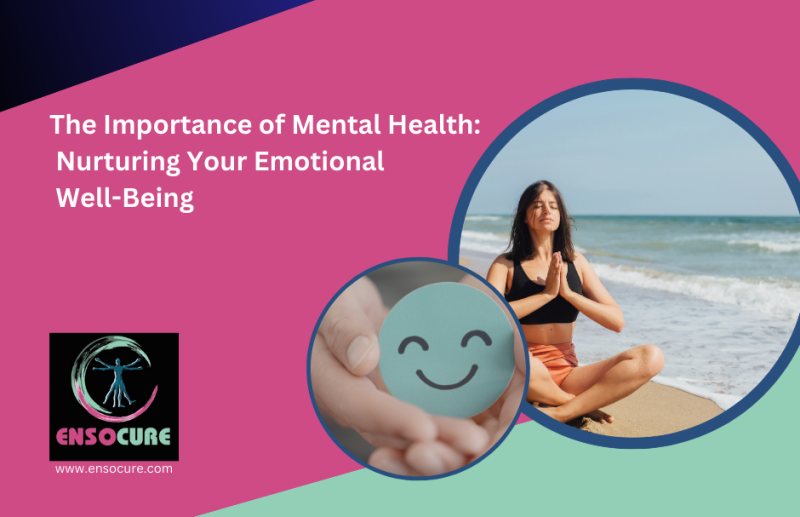Mental health is not merely the absence of mental illness; rather, it encompasses a state of emotional well-being that significantly impacts every facet of our lives. Just as we care for our bodies to lead healthy lives, nurturing our mental health is essential for a fulfilling and balanced existence. Here’s why the importance of mental health holds such profound significance for all.
At some point or the other, you might have struggled with your mental health as has everyone in the world. Life is a journey full of unexpected challenges, on top of that, there are incidents like loss, bad news, financial problems, as well as educational and career goals.
According to the WHO (World Health Organization), 970 million or 1 in 8 people worldwide were found to be suffering from a mental disorder. In India alone, a 2017 Lancet report found in 197·3 million people had mental disorders, including 45·7 million with depressive disorders and 44·9 million with anxiety disorders. This proves how mental health is a concerning issue that needs to be addressed, but more than being managed, what’s important is adopting a lifestyle that strengthens your mental stability, makes you more efficient in stress management and improves your mental wellbeing.
What is Mental Health?
Mental health can be defined as an emotional mental status that encompasses emotional, psychological, and social well-being. People who are mentally healthy, have a positive outlook of life, engage well socially, maintain relationships, and accomplish daily tasks without being emotionally overwhelmed by them. Mental health is more of a balanced situation where one is empowered to address life and their goals, step by step. Alternately, mental health issues can upset this emotional balance leading to issues such as depression, and anxiety negatively impacting relationships, education, career, and daily life. Thus, it is safe to say, that the importance of mental health is as important as life itself.
Silent Symptoms of Poor Mental Health
Poor mental health can manifest in a variety of ways, and some of these symptoms may not be as easily recognizable as others. Here are some silent or less obvious symptoms of poor mental health that individuals might experience.
- Physical Ailments: Mental health issues can often manifest as physical symptoms such as headaches, stomachaches, muscle tension, and general bodily discomfort without any apparent physical cause.
- Appetite changes: Poor mental health can lead to changes in eating patterns, resulting in weight gain or loss. Some individuals may overeat to cope with emotions, while others may lose interest in food.
- Fatigue and Low Energy: Mental health challenges can leave individuals feeling drained, both mentally and physically, even after adequate rest. This persistent fatigue can impact daily functioning and quality of life.
- Sleep Disorders: Insomnia or disrupted sleep patterns can be indicative of underlying mental health issues, such as anxiety or depression. Some individuals might have difficulty falling asleep, while others may wake up frequently during the night.
- Isolation and Withdrawal: People with poor mental health may gradually withdraw from social interactions, hobbies, and activities they once enjoyed. They might isolate themselves to cope with their emotions or due to a lack of interest.
- Irritability and Mood Swings: Unexplained irritability, mood swings, or sudden outbursts of anger can be signs of poor mental health. Individuals may struggle to manage their emotions and reactions.
- Cognitive Difficulties: Poor mental health can lead to difficulties with concentration, memory, decision-making, and problem-solving. Individuals might find it challenging to focus on tasks and make even simple choices.
- Physical Neglect: Neglecting personal hygiene, cleanliness, and self-care can be an indication of deteriorating mental health. Individuals may lack the motivation or energy to take care of themselves.
- Perfectionism: An excessive need for perfection and constant self-criticism can be a silent symptom of poor mental health. This behavior might stem from anxiety, low self-esteem, or other underlying issues
- Physical Pain: Chronic pain, such as backaches or muscle tension, that does not respond well to medical treatment might be linked to mental health struggles. Emotional distress can contribute to or exacerbate physical pain.
Other Symptoms
• Low confidence or self esteem
• Feeling of hopelessness
• Engaging in negative behavior (self-injury, promiscuity, compulsive behavior)
It is important to remember symptoms of mental disorders vary widely from person to person and may be caused by various factors. If you or someone you know is experiencing any of these symptoms, seek help from a mental health professional immediately. A diagnosis in time helps formulate an effective treatment plan that quickens the road to mental healing.
Types of Mental illnesses
According to the CDC, (Centers for Disease Control and Prevention), there are over 200 types of mental disorders some of which can even occur simultaneously. Some occur for short periods of time, while others can be chronic or episodic. What is unfortunate is how mental disorders can afflict someone without warning, although in most cases it is preceded by trauma or triggers that put you at risk of a mental disorder.
Risk Factors of Mental Illness Include
- Negative childhood experiences
- Childhood trauma
- Past or present trauma
- Present or past experiences of being abused or assaulted
- Accident trauma
- Sudden loss of loved ones
- Chemical imbalances in the brain
- Chronic illness
- Substance, medication, and drug abuse
Compelling Reasons Why Mental health is Important
Now that you know the basic facts and the importance of about mental health in everyday life, you will understand why taking care of it is just as necessary and important as your career, life goals, and a major part of self-care without which, life could be distressing to say the least. Here are the main reasons of the importance of mental health.
It is the Foundation of Overall Well-Being
Mental health serves as the cornerstone of our overall well-being. Just as a strong foundation is vital for a sturdy building, a healthy mind is crucial for a fulfilling life. When we prioritize mental health, we equip ourselves with the emotional tools necessary to navigate life’s challenges, build resilience, and maintain a positive outlook.
It Impacts Your Physical Health
The mind and body are intricately connected, and neglecting our mental health can have a cascading effect on our physical well-being. Chronic stress, anxiety, and depression can contribute to a host of physical ailments, including cardiovascular disease, diabetes, stroke, immune system suppression, and digestive issues.
Prioritizing mental health reduces the risk of these physical health problems and enhances our overall vitality. Simultaneously, chronic physical illnesses can also cause mental health issues over time. There is a circular loop between mental health and physical symptoms where mental issues can lead to somatic symptoms due to tension, worry and stress.
Effective Coping and Resilience
Life is full of ups and downs, and our ability to cope with adversity depends largely on our mental health. A strong mental foundation equips us with the tools to navigate challenges, manage stress, and bounce back from setbacks. Improved mental health fosters resilience, enabling us to face difficulties with a positive mindset and a sense of control.
Healthy Relationships
Healthy relationships are built on effective communication, empathy, and understanding – all of which are influenced by our mental health. When we prioritize our emotional well-being, we’re better equipped to foster meaningful connections with others, resolve conflicts, and offer support to our loved ones.
Productivity and Achievement
A healthy mind is a productive mind. Mental health plays a pivotal role in our ability to focus, make decisions, and perform at our best. When we’re emotionally well, we’re more likely to set and achieve goals, excel in our careers, and engage actively in our pursuits.
Enhanced Quality of Life
Ultimately, the goal of nurturing mental health is to lead a more fulfilling and satisfying life. A positive mental state allows us to experience joy, gratitude, mindfulness, and a sense of purpose. It enables us to savor life’s moments, find beauty in the everyday, and cultivate an optimistic outlook.
Reducing Stigma
Prioritizing mental health contributes to the ongoing efforts to reduce the stigma surrounding mental illness. When we openly discuss, acknowledge, and seek support for our emotional well-being, we contribute to a more inclusive and compassionate society. By valuing mental health, we pave the way for others to do the same, creating an environment where seeking help is normalized and encouraged.

Mental health is a fundamental aspect of our well-being impacting every facet of our lives. By recognizing the importance of mental health and taking steps to nurture it, we invest in our overall quality of life, our relationships, and our ability to face challenges with resilience and grace. At Ensocure Integrated Medicine Bengaluru, we acknowledge how mental health is important even in the recovery and rehabilitation from physical ailments. Be it adolescents or the elderly, Ensocure offers counseling services in clinic and as part of Ensocure Prime healthcare plans.

